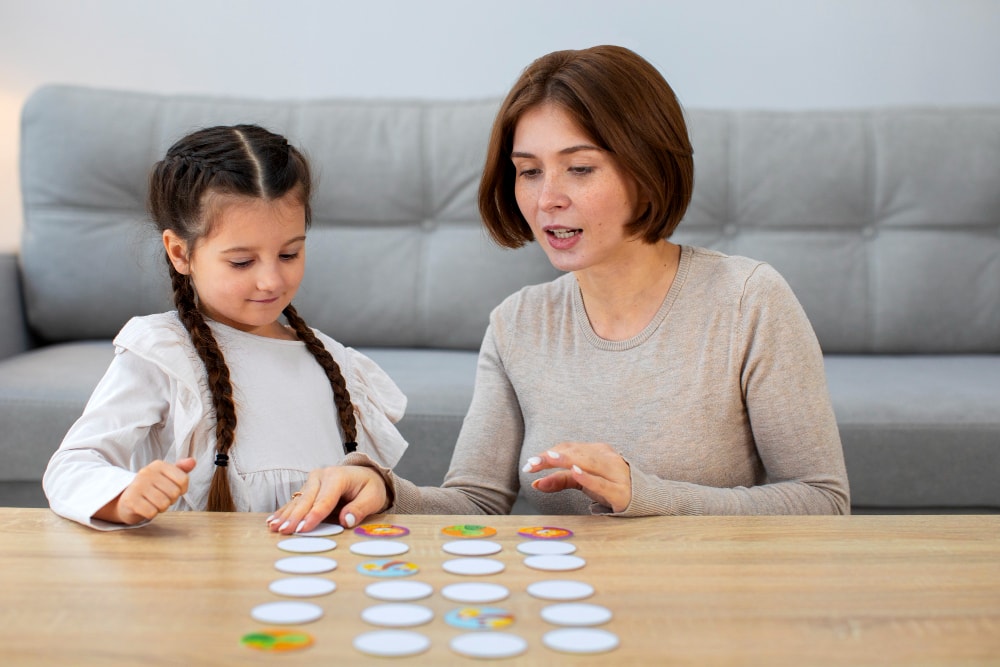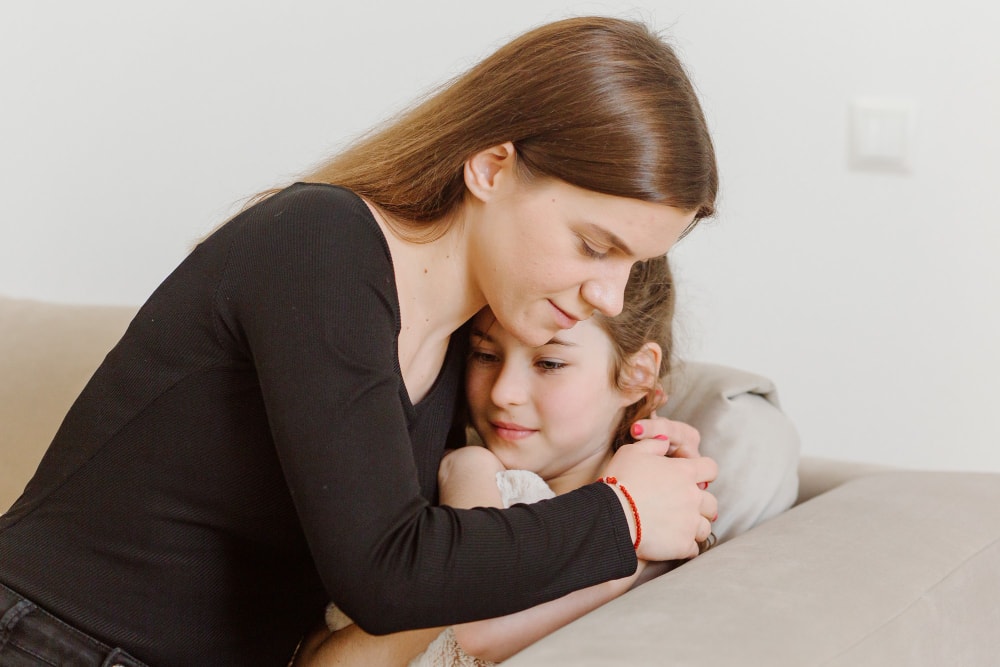
In today’s emotionally complex world, raising emotionally intelligent children is more important than ever. Emotional intelligence (EQ) is the ability to recognize emotions, understand and manage your own feelings, and respond to the feelings of others in a healthy, productive way.
For children, teaching emotional intelligence at an early age lays the foundation for better mental health, stronger positive relationships, improved self-awareness, and the ability to solve problems with empathy and confidence.
The Benefits of Raising an Emotionally Intelligent Child
When children learn emotional intelligence, they get the tools to navigate life with resilience.
An emotionally intelligent child can:
- self regulate
- recognize different feelings
- express emotions in a healthy way.
Even during temper tantrums or moments of anger, an emotionally intelligent child can manage their emotions effectively.
When kids learn to self-regulate early in their lives, they grow up into well-rounded adults with social and emotional intelligence.
Emotional intelligence isn’t just encompasses essential behavioral and emotional skills that support better academic performance, social and emotional growth, and long-term well-being.

How to Teach Emotional Intelligence to Kids at Home
Building emotional competence in early childhood doesn’t require a formal lesson plan or a classroom setting. It starts at home with daily conversations between parents and children, mindful parenting, and modeling healthy emotional behaviors.
Here are tips to help your child recognize and express their own emotions and understand the emotional experiences of others:
1. Build an Emotional Vocabulary
Label different feelings
Help your child develop an emotional vocabulary by labeling different feelings as they feel each emotion.Use simple language like, “You look frustrated,” or “I see you’re sad.” When a child can identify what they’re feeling, they’re better equipped to manage it.
Use read-aloud books that explore children’s feelings to naturally introduce a range of emotions, from small to big feelings.
Identify facial expressions to build emotional intelligence
Point out facial expressions in the illustrations and ask, “How do you think she’s feeling?” This builds emotional awareness and empathy.

2. Validate, Don’t Dismiss
When a child is overwhelmed by their own emotions, avoid saying things like “Don’t be sad” or “You’re overreacting.” Instead, validate their emotions by saying, “It’s okay to feel disappointed,” or “That must be hard.”
Acknowledge distressing feelings
Acknowledging unpleasant feelings helps children feel understood and teaches them that all emotions are part of the human experience and not something to be ashamed of.
This encourages kids to raise their self-awareness and recognize complex emotions in others.
3. Model Emotional Intelligence
Kids learn by watching the adults around them, including their parents and older family members.
Show them how you express emotions and manage your own feelings in tough situations. Say things like, “I’m feeling stressed, so I’m going to take a deep breath and focus.”
Demonstrating how adults self-regulate during difficult moments helps children develop similar habits and behaviors.
Show them how you problem solve, practice empathy, and bounce back from emotional challenges.

4. Practice Empathy Together
Use everyday moments to teach empathy and welcome all small and big feelings together. Use these moments as an opportunity for emotional intelligence education.
If your child sees another child crying, ask, “Why do you think he’s upset? What could help him feel better?”
You can also use role play to help your child explore different feelings and scenarios. Pretend you’re in a situation together and ask them how they’d feel and respond.
Focus on how they problem-solve each scenario and direct them to manage big feelings in certain ways that are healthy and constructive.
This kind of emotional learning builds empathy and sharpens social understanding.
5. Create a Safe Space for Expression
Turn you home a judgement-free zone
Encourage self-expression by making your home a judgment-free zone. Let your child know it’s safe to talk about big emotions like fear, shame, or anger.
A few examples of how you can encourage your children to strengthen their emotional intelligence skills include setting up a “Feelings Corner” where they can draw, write, or talk about what they’re feeling.
Art, music, or movement can also be powerful ways to express emotions for children who struggle with verbal communication.

6. Teach Emotional Intelligence to Kids: Coping Tools and Emotion Regulation
Children need guidance on emotion regulation. It’s important that children learn how to calm down when emotions run high.
Teach your kids simple strategies like taking a deep breath, counting to ten, hugging a stuffed toy, or talking it out.
Offer choices: “Would you like to take a break or talk to me about it?” Helping them manage behavior without shame fosters emotional development and independence.
7. Talk About Your Own Emotions
Your child learns how to handle their own feelings by observing how you handle yours. Don’t be afraid to narrate your emotional experiences: “I’m sad that our plans changed, but I know we’ll find something else fun to do.”
Sharing your own reactions in a calm and honest way shows that adults have big feelings too—and that it’s okay to feel them.

8. Focus on Connection, Not Control
Rather than punishing a child for expressing big emotions through behaviors that aren’t ideal, stay connected.
Kneel to their level, make eye contact, and encourage them to talk through their emotions by saying something like, “I’m here. Let’s figure this out together.”
Children are more open to learning when they feel connected and safe. This strengthens relationships and deepens your child’s trust in you.
9. Celebrate Emotional Growth
Acknowledge and celebrate progress: “You were really mad earlier, but you calmed down and told me how you felt. That’s a big step!” Recognizing these wins helps reinforce emotional skills and builds confidence.
Through regular reinforcement from parents, children learn to incorporate social and emotional skills into their daily behavior.

10. Make Emotional Intelligence Part of Everyday Life
Talk about feelings over dinner. Reflect on your day together. Ask your kids questions like “What made you feel happy? Was there anything that made you feel nervous or upset?”
These lines of questioning encourage them to feel the full range of emotions effectively.
By weaving emotional awareness into everyday routines, you’re not only nurturing emotional intelligence, you’re also creating stronger family bonds and raising a high EQ, resilient human being.

The Power of Community in Emotional Learning
Helping children understand and express their own emotions is a key part of raising healthy, empathetic, and confident individuals.
While emotional intelligence starts at home, it’s also strengthened by the community around your child.
Neighborhood friendships, school connections, and daily social interactions all contribute to a child’s ability to practice empathy, build positive relationships, and understand how others feel and act.
A supportive environment plays an equally important role in emotional development, giving kids more chances to learn how to express themselves, resolve conflicts, and solve problems in a healthy and respectful way.
At Camella, we understand how crucial it is to raise not just intelligent, but emotionally intelligent children.
That’s why Camella communities are thoughtfully designed with safe, family-friendly spaces where your children can build friendships, explore safely, and interact meaningfully with others.
From open parks to play areas and active neighborhood events, Camella provides the kind of nurturing environment where your child’s emotional and social growth can truly flourish.
So the next time your child is feeling “all the things,” remember: pause, pay close attention, and be their guide in the moment.
You’re not just helping them through one temper tantrum; you’re teaching them how to understand and handle the full range of emotions for years to come.

Celebrate Life’s Milestones in Camella!
House and Lot & Condominium for Sale in the Philippines

